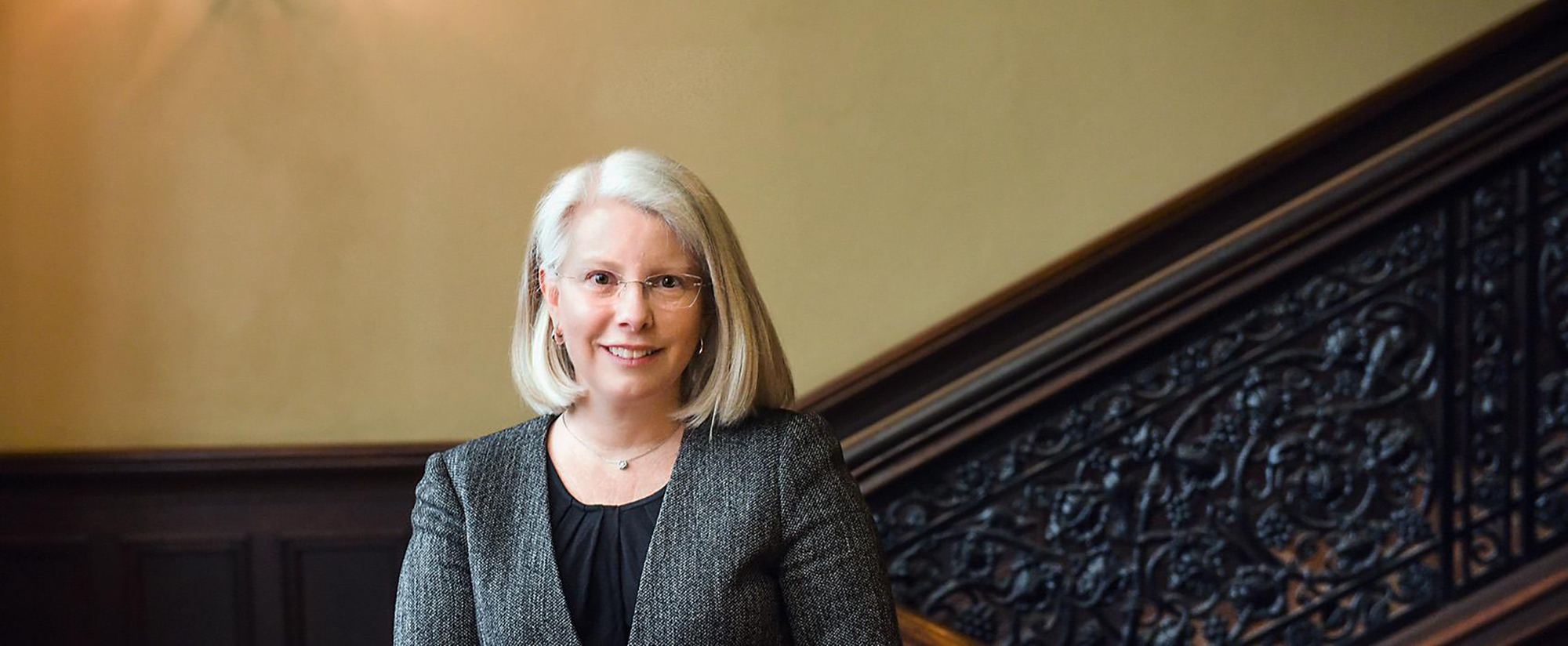
After serving as interim dean of the Division of the Social Sciences since July 2017, Amanda Woodward, the William S. Gray Distinguished Service Professor of Psychology, was appointed dean effective April 4, 2018. (Photography by Jean Lachat)
Dean Amanda Woodward reports from a Social Sciences Division with close ties and broad horizons.
Through the work of the Social Sciences Division’s faculty and students, I see daily examples of how our exceptional strengths in social theory, statistical methods and formal modeling, and qualitative studies of human social life distinguish us as a leader in research and education.
With programs consistently ranked at the top, we are at the vanguard of social science inquiry and impact. Whether through the field-defining scholarship of the Chicago schools of economics and sociology, the path-breaking impact of the first graduate international affairs program in the United States, the creation of the interdisciplinary Department of Comparative Human Development and John U. Nef Committee on Social Thought, or other pivotal milestones, the division has repeatedly transformed the social sciences since our founding in 1930.
We provide doctoral, master’s, and College students with an exceptional breadth and depth of educational opportunities, through PhD degrees in nine disciplines, master of arts degrees in five interdisciplinary fields, and a rich set of joint graduate programs in partnership with other divisions and schools. Interdisciplinary initiatives in international research and in social data analytics position us to lead in crucial emerging areas and further enrich our academic offerings.
Undergraduate interaction with division faculty is a cornerstone of the College experience, both in the Core curriculum and in a dynamic set of majors and minors that continue to grow and evolve. Last spring we launched specializations in business economics and data science within the economics major (the largest College major), building on strong connections with Chicago Booth and the Department of Computer Science. In the coming year, we will introduce interdisciplinary minors focusing on health, education, and data analytics, programs enriched by offerings in Harris Public Policy, the School of Social Service Administration, and the Biological Sciences Division.
We also bring our scholarship to bear on the diverse and pressing problems we face as a society. For example, Ada Palmer, an associate professor in the Department of History who appears in this issue of the Magazine (see Original Source, “Smear Tactic”), is co-organizing a fall quarter dialogue series, Censorship and Information Control During Information Revolutions, that brings together scholars of earlier information revolutions and places them in conversation with journalists, editors, authors, activists, and other experts on the contemporary information revolution. Each session is open to the public and will be recorded for viewing online. The series is complemented by an exhibit in Regenstein’s Special Collections Research Center that runs through December 14.
New developments reinforce our capacity to continue such transformational approaches. Among many examples, the $125 million gift commitment from Kenneth C. Griffin, a University trustee, to our Department of Economics is expanding our leadership in education and research, increasing financial support for students, and augmenting our efforts to impact the world through economic inquiry and analysis. Resulting initiatives through its new research incubator will span micro- and macroeconomics and reflect the increasingly interdisciplinary nature of the social sciences.
With support from members of the Social Sciences Council, our Social Sciences Research Center is fostering multimethod collaborative approaches and providing specialized resources for launching and scaling pilot projects into major programs. The SSRC maximizes our flexibility to respond to evolving research needs and strategic priorities, including new data science and quantitative approaches, and offers significant opportunities for continued innovation.
At the core of these and all our other achievements is a defining characteristic: we are a community of scholars. Those connections extend from our faculty and students to our alumni and to those interested in the crucial questions explored across social science disciplines. We strive for a sense of connectedness in our long-term and strategic plans and in our day-to-day as well. This fall, for example, we have reinstituted the SocTea, a division tradition. These monthly gatherings bring faculty and doctoral students together informally, and those afternoons’ introductions and conversations both reflect and extend the legacy of transformational research and education upon which we are built.
We sustain and are enriched by activities that naturally reach across divisions and schools, from faculty research collaboration to graduate education and undergraduate teaching. I am honored to serve as dean and look forward to all that our students, faculty, and alumni will continue to achieve.
